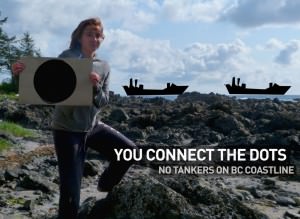Oil, Pipelines, and First Nations: When Ecological and Economic Interests Collide
Conclusions
Weyler reassures me that “since the bitumen pipelines and tankers also threaten the land, rivers, and marine ecosystems, the movement to stop them – Nebraska farmers, First Nations, environmentalists – are not contemplating settling for ‘alternative routes’ and so forth.”
When I asked Hobeshield the same question I had asked Weyler to elicit that response – which was “how far are you willing to go? Are you ready to make any concessions?” – she responded that as “[w]ith any proposed project, there is likely some degree of opposition and [their] proposed expansion is no different. [They] understand the passion that [their] stakeholders and Aboriginal communities have for their interests and [they] will strive to address any concerns that may arise. [They] hope that all who are interested in [their] proposed project will engage in meaningful and constructive dialogue with [them].”
Asked to comment on Weyler’s claims that there haven’t been proper and unbiased consultations with First Nations now or prior to any of their undertakings, she simply repeated that “engagement with Aboriginal governments and peoples is very important for both [their] ongoing operations and any new projects…”
She also assured me that with new projects, Kinder Morgan wants to bring “First nations into the discussions at the planning and project scoping stage where their knowledge and insight about their traditional territory adds value to key decision making processes.” She added that “…even before reaching a decision to proceed with a project, Kinder Morgan took the opportunity to inform Aboriginal groups about the Trans-mountain open season process and how the results of that could potentially evolve into a project.”
When asked with what purpose was Terasen Gas bought in 2005 and why was it sold a year later, her answer was that “the Trans-mountain Pipeline is an important piece of infrastructure providing the only existing West Coast access for Canadian oil products and Kinder Morgan has always be open and dedicated to an inclusive and transparent consultation process that will oversee all aspects of the proposed expansion.”
[pullquote]Empirical scientific evidence has time and time again proven that the ecology and marine life that were affected by the spill still have not recovered and show no signs of doing so in the near future. [/pullquote]Finally, I asked her what would Kinder Morgan have to say to the people of the Athabasca, Chipewyan First Nation, who’ve reported the highest levels of new cancers due to Tar Sands development. Hobeshield answered that “safety is at the core of Kinder Morgan Canada’s business. The Company is committed to keeping its pipelines safe and protecting the public, its employees, and the environment. The Company strives to safeguard its facilities and meet or exceed all applicable federal, provincial and local regulations.”
In the streets of Toronto, people seem somewhat divided over the topic. Some argue that to continue enjoying a thriving first world economy and the many social advantages that we do, Canadians should play their strongest trump card – in this case, the Tar Sands, which they consider the blood-life of the country. For this reason, they view the pipelines and their proposed expansions as the veins that will keep the system alive.
Indeed, with over 1.73 Trillion barrels of crude bitumen in the Tar Sands (170 billion of which are recoverable with current technology and estimated to last 100 years), tremendous economic gains for the country have been cited. Job creation, economic stimulation and commercial partnerships solidified, among others.
But to those who oppose it, which as we saw is heavily concentrated among First Nations, environmentalists, farmers and regular citizens, the Tar Sands resemble more closely cancerous blood-cells, and the pipeline expansions as the varicose veins that will transport them.
Needless to say, up here in the Great North we have unmatched beauty from coast to coast, including everything from national parks and fauna to thriving aboriginal communities and their cultures. There is a lot to discover all along the frigid colds of the North, the green pastures of the Western Prairies or the untamed waters of the Eastern Maritimes.
Where do you stand on the subject? Is all of that beauty and the environment worth sacrificing for huge economic gains? Will the environment even be affected in the first place? Is it all exaggeration by environmentalists and Aboriginals? Is it manipulation or greed from Big Oil?
Let us know what you have to say about this controversial and crucial topic!
Sources:
– Interviews conducted by ARB.
Rex Weyler (Co-founder, Greenpeace International)
Lexa Hobeshield (External Relations, Kinder Morgan Canada)
External
– KINDER MORGAN
– GREENPEACE
– TANKER FREE BC
– CBC
– CTV (VIDEO ON YOUTUBE)
– VANCOUVER SUN
– NEWS 1130
– AAVAZ.ORG
– WHITE WOLF PACK (VIDEO OF DEFORMED FISH)
– WALL STREET JOURNAL
– THUNDERBIRD
– WATERSHED SENTINEL
– GLOBE AND MAIL
– BC LOCAL NEWS
ARB Team
Arbitrage Magazine
Business News with BITE.
Liked this post? Why not buy the ARB team a beer? Just click an ad or donate below (thank you!)
Liked this article? Hated it? Comment below and share your opinions with other ARB readers!































Share the post "Oil, Pipelines, and First Nations: When Ecological and Economic Interests Collide"